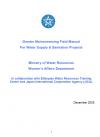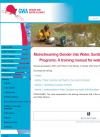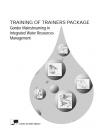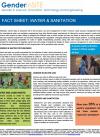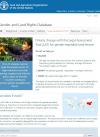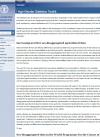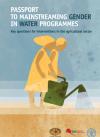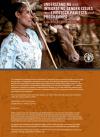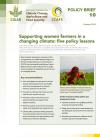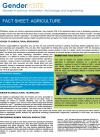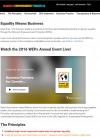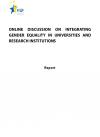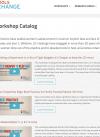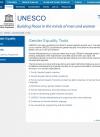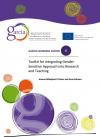Resources
21 Sep 2016
Ethiopia Ministry of Water Resources and Women’s Affairs Department, 2005: Manual enables regional water sector personnel to easily understand and optimally utilize the gender equality perspective in their day-today operations. It presents gender analysis tools and mainstreaming methodologies to facilitate gender sensitive development in the sector.
REGIONS: Sub-Saharan Africa
21 Sep 2016
Gender and Water Alliance/Rwanda Ministry of Gender and Family Promotion, 2007: Manuel provides participatory gender-sensitive training for water professionals at the policy, project and administrative levels through building their capacity for mainstreaming gender into WASH programs.
REGIONS: Sub-Saharan Africa
21 Sep 2016
Gender and Water Alliance, 2003: Training package provides a detailed account of the gender approach in integrated water resources management for managers, planners and trainers who are concerned with policy development and implementation of integrated water resources management programs and projects.
TYPE: Training
21 Sep 2016
GenderInSITE, 2015: GenderInSITE, 2015: Fact sheet provides at-a-glance overview of gender issues in water and sanitation.
TYPE: Data
20 Sep 2016
FAO: This tool offers a scroll-down list of legal indicators for gender-equitable land tenure. The indicators focus on the elimination of gender-based discrimination in the constitution, in inheritance, nationality, property rights and access to justice among others.
TYPE: Monitoring & Assessment, Data
20 Sep 2016
FAO: Database provides examples of gender relevant questions and tables jointly developed by national statisticians and FAO for agricultural censuses undertaken in Africa between 1993 and 2006, in support of enhanced production and use of sex-disaggregated agricultural data.
REGIONS: Sub-Saharan Africa
20 Sep 2016
FAO, 2012: Booklet provides guidelines for field staff in mainstreaming a gender perspective during the design, implementation, operation and maintenance of water management projects for agricultural production; it is designed to be a rapid appraisal tool to
identify the main gender-related problems and gaps that require attention during these stages of a project.
20 Sep 2016
FAO, 2013: Booklet identifies the main constraints faced by women and men in accessing, controlling and managing small livestock and dairy farming, and helps practitioners to design projects and programmes that address these challenges.
20 Sep 2016
CCAFS/CGIAR, 2015: Policy provides five policy lessons to support women farmers in relation to climate change, based on evidence from research in low- and middle income countries and offers guidelines for crafting gender-responsive climate policies at global and national levels.
TYPE: Policy briefs
20 Sep 2016
GenderInSITE, 2015: Fact sheet provides at-a-glance overview of gender issues in agriculture and food security.
TYPE: Data
20 Sep 2016
UN Global Compact/UN Women: A set of principles to help the private sector focus on key elements integral to promoting gender equality in the workplace, marketplace and community.
20 Sep 2016
European Institute for Gender Equality (EIGE): Report identifies key factors in promoting gender equality within research organizations, discusses how the effectiveness of gender equality initiatives can be assessed, and identifies stakeholders' needs and priorities in relation to measures that could be made available for research institutions to support gender equality.
TYPE: Reports
20 Sep 2016
Tools for Change in STEM: A series of online workshops for to help universities retain women scientists, including workshops on best practices for family friendly policies and on individual strategies for women navigating workplaces that are shaped by implicit bias.
TYPE: Training
20 Sep 2016
UNESCO: A collection of tools to provide practical guidance and useful definitions that serve as a basis for effective mainstreaming of gender equality for any government staff or individual working in civil society organizations.
20 Sep 2016
GARCIA Project, 2015: Toolkit to help researchers integrate the gender dimension in their ongoing research and teaching (of undergraduate, graduate and doctoral courses), to apply to new projects and students’ curricula, and to produce gender-sensitive outcomes.
TYPE: Toolkits
- ‹ previous
- 5 of 9
- next ›




